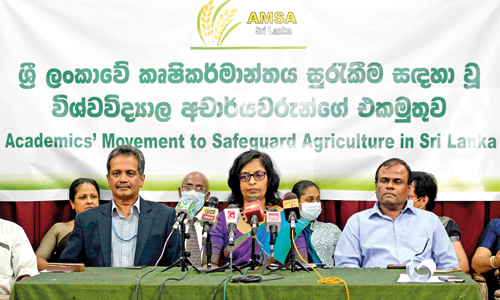Agricultural experts in new think-tank to safeguard industry

At the media conference.
Sri Lanka marked one year to the day on Tuesday when the agriculture- dependent nation saw its leaders take the country back by imposing regulations banning all chemical imports, sending it reeling down the path towards rice imports, the staple diet of its people.
April 27, 2021 is a day that will be a black mark in the agriculture history of Sri Lanka when the government of the day insisted that it will adopt a complete shift to organic farming thereby banning synthetic fertilisers and other pesticides and weedicides, Peradeniya University Snr. Prof. Buddhi Marambe said at the launch of the recently established pressure group Academic’s Movement to Safeguard Agriculture in Sri Lanka held at the Centre for Society and Religion (CSR) on Tuesday.
He noted that 70-80 years back Sri Lanka yielded 650 kg per hectare (ha) but following on scientists found ways to improve productivity to 4, 300 kg per ha. “This was turned around by the decision of man and we have moved back,” he said insisting that as a result of this Sri Lanka is losing its food security.
While paddy cultivation reduced by over 40 per cent, he said maize production, mainly used for animal feed, dropped by 70 per cent.
Consequently today Sri Lanka requires foreign exchange to import rice and tea income has also incurred a US$52 million loss in the first quarter of this year, Prof. Marambe highlighted.
“They have not just caused a grave economic crisis but also led to farmers facing the brunt of low productivity,” he explained.
Prof. Anura Kumara speaking on the occasion said that this decision led to Sri Lanka losing its national pride, its national food security and grave losses for farmers.
Sri Lanka imported 35 per cent of its rice consumption since independence for 60 years; but lately this situation changed and the country became self-sufficient in rice.
Prof. Kumara scoffed at China’s humanitarian aid in granting 2000 MT of rice to Sri Lanka which he said is sufficient for one meal for the entire country. “As a result of this we lost our national pride as well,” he said.
Ranking high to achieving food security in the region the country lost out on this as well, he noted.
Further he explained high priced fertiliser is unaffordable to the average farmer, and without adequate fertiliser and weedicides in the market the country will be impacted with another downturn this Yala season.
Moreover, if Sri Lanka does not have the required seed paddy the yields for the next Maha season will also be adversely impacted, he explained.
Prof. Janendra De Costa pointed out that in the face of these circumstances, the country needs to adopt integrated cultivation techniques, notably the use of integrated nutrients, integrated pesticides regulation and best agricultural practices.
At the national level decisions should be made by taking into consideration the scientific findings and following consultative discussion, he explained.
Dismissing the use of nano fertiliser from India, it was pointed out that this was like just providing water to the plant and noted that it was unfortunate that Sri Lankan farmers were compelled to use these.
Prof. Saman Dharmakeerti noted that the government created a “billek” and tried to scare the people against the use of chemical fertiliser in the country.
He noted that Sri Lanka paid to give water to farmers in the form of nano fertiliser that was imported from India.
Prof. Warshi Dandeniya told the Business Times on the sidelines of the media briefing that currently this new body is involved in boosting the morale of the farmers to ensure that they will get back onto the fields to recommence cultivation.
She said, they needed to ask them to cultivate something and not give up their lands pointing out that most farmers have today given up prospects of cultivation. “If they lose their morale what will happen?” she queried.
Hitad.lk has you covered with quality used or brand new cars for sale that are budget friendly yet reliable! Now is the time to sell your old ride for something more attractive to today's modern automotive market demands. Browse through our selection of affordable options now on Hitad.lk before deciding on what will work best for you!


